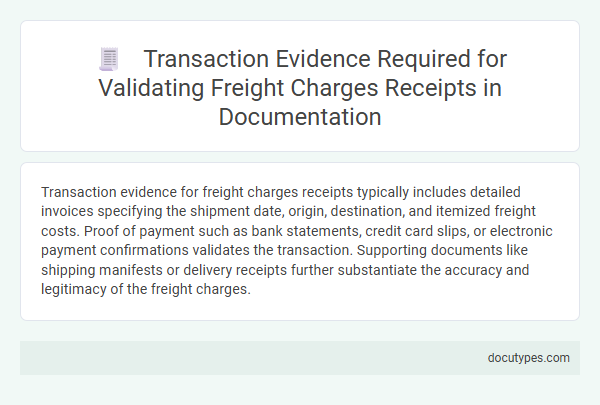Transaction evidence for freight charges receipts typically includes detailed invoices specifying the shipment date, origin, destination, and itemized freight costs. Proof of payment such as bank statements, credit card slips, or electronic payment confirmations validates the transaction. Supporting documents like shipping manifests or delivery receipts further substantiate the accuracy and legitimacy of the freight charges.
Importance of Accurate Documentation for Freight Charges
Accurate documentation of freight charges is essential for verifying costs and maintaining transparent financial records. Proper transaction evidence supports dispute resolution and ensures compliance with accounting standards.
- Freight Bills - These detailed invoices from carriers provide itemized charges and shipment specifics.
- Proof of Delivery - Signed delivery receipts confirm the successful receipt of goods and validate freight costs.
- Payment Records - Clear payment confirmations link freight charges to actual financial transactions for auditing purposes.
Essential Elements of a Valid Freight Receipt
A valid freight charges receipt must include specific transaction evidence to ensure accuracy and accountability. Essential elements such as the date of shipment, carrier's name, and detailed description of goods provide clear proof of services rendered.
The receipt should also display the freight charges amount, payment terms, and signature of the authorized carrier or agent. You can use this documentation to verify and reconcile transportation expenses effectively.
Key Transaction Evidence Required for Freight Validation
What key transaction evidence is needed for validating freight charges receipts? Accurate validation requires documentation such as the freight bill, proof of delivery, and the original purchase order. These records ensure the freight charges align with agreed terms and actual services provided.
Standard Supporting Documents for Freight Charge Claims
Standard supporting documents for freight charge claims include the original invoice detailing the freight services, the bill of lading as proof of shipment, and delivery receipts confirming the goods were received. These documents provide transaction evidence essential for verifying charge accuracy and ensuring compliance with payment terms. Maintaining organized records of these items streamlines audit processes and dispute resolution related to freight charges.
Verification Checklist for Freight Receipts
Transaction evidence for freight charges receipts must include detailed shipping invoices, proof of delivery, and freight carrier documentation to ensure accuracy and legitimacy. Verification checklist for freight receipts involves cross-referencing shipment dates, verifying consignee information, and confirming freight costs align with agreed contract terms. You should maintain these records to support audits and dispute resolutions effectively.
Common Discrepancies in Freight Documentation
Accurate transaction evidence is essential for verifying freight charges in receipts. Common discrepancies in freight documentation can lead to payment delays or disputes.
- Incorrect Weight Measurements - Discrepancies often occur when the documented cargo weight differs from the actual shipment weight, affecting charge calculations.
- Mismatched Shipping Dates - Errors arise when the shipping date on the receipt does not align with the documented transport schedule, causing confusion in billing cycles.
- Inconsistent Freight Rates - Variations between agreed-upon rates and those listed on receipts frequently result in contested payment amounts.
Acceptable Proof of Freight Payment Methods
Transaction evidence for freight charges receipts must include acceptable proof of payment methods such as bank statements, credit card slips, or official payment confirmations. These documents validate the legitimacy and accuracy of the freight payment.
Acceptable proof of freight payment methods often includes electronic fund transfer receipts, courier service payment acknowledgments, and detailed invoices specifying the freight charges. Supporting documentation should clearly show the date, amount, payer, and payee information. Proper evidence ensures compliance with accounting standards and facilitates dispute resolution.
Regulatory Guidelines for Freight Charge Validation
| Regulatory Guideline | Requirement | Details for Freight Charge Validation |
|---|---|---|
| IRS Documentation Requirements | Accurate Record-Keeping | Receipts must clearly show the freight charge, date of service, and parties involved to qualify as valid expense evidence. |
| FTA (Federal Transit Administration) Regulations | Itemized Freight Invoices | Invoices must itemize freight services separately, including weight, distance, and rate details for cost verification. |
| DOT (Department of Transportation) Guidelines | Carrier-Specific Documentation | Receipts or bills must include carrier name, transaction date, and freight description as proof of service delivery. |
| GAAP (Generally Accepted Accounting Principles) | Transaction Evidence | Freight receipts must have clear indication of amounts paid and must be preserved for audit purposes. |
| Customs and Border Protection (CBP) | Import/Export Freight Validation | Freight charge evidence must accompany import/export documentation to validate cost for customs clearance. |
Best Practices for Maintaining Freight Transaction Records
Freight charges receipts serve as crucial evidence for validating shipment costs and ensuring accurate financial records. Transaction evidence typically includes bills of lading, shipping invoices, and payment confirmations from freight carriers.
Best practices for maintaining freight transaction records involve organizing documents by date and shipment ID to facilitate easy retrieval. Digital storage with backup systems enhances security and allows for efficient auditing and compliance verification.
What Transaction Evidence Is Needed for Freight Charges Receipts? Infographic

